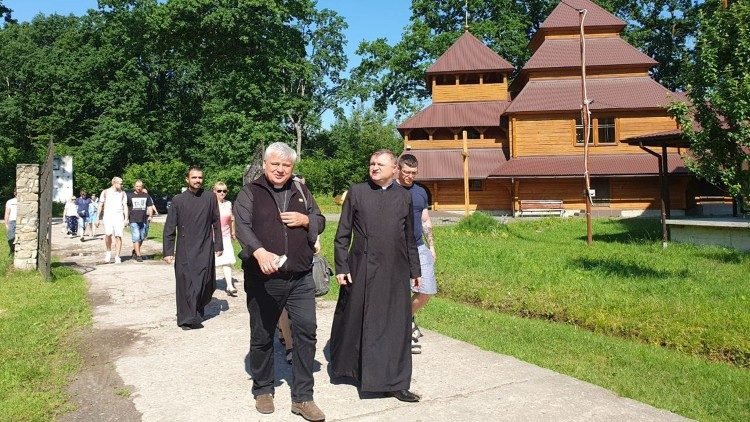Cardinal Konrad Krajewski, the Papal Almoner, is currently visiting the Ukrainian city of Kherson for his sixth mission to provide aid and solace to the war-torn country and its affected population.
By Salvatore Cernuzio
Cardinal Konrad Krajewski, the Prefect of the Dicastery for the Service of Charity, arrived in Kherson on Tuesday as part of his most recent mission to war-torn Ukraine.
In a voice message sent to Vatican News, the Cardinal referred to this endeavor as an “evangelical expedition.”
In recent weeks, the southern Ukrainian city of Kherson experienced the destruction of the Kakhovka hydroelectric dam, resulting in the flooding of more than 80 villages and towns, the devastation of 20,000 hectares of farmland, and the spilling of over 150 tons of oil.
Cardinal Krajewski arrived in Kherson, driving a truck laden with food supplies (mainly sourced from South Korea, including over 100,000 freeze-dried soups).
He also brought with him vital medicines from the Vatican, Gemelli Hospital, and a solidarity fund based in Naples.
Humanitarian mission
Departing from Rome on June 22, the Cardinal embarked on a journey of over 3,125 kilometers. “So many roads, so many kilometers,” he recounted.
After spending Sunday night in the Ukrainian city of Odessa, Cardinal Krajewski visited Drohobyč on Monday, the area’s second-largest economic center located nearly 100 kilometers from Lviv.
He toured a Greek Catholic humanitarian center that extends aid and refuge to those in need. The Cardinal then visited a local hospital, a center for alcoholics, and a children’s center, which now serves as a sanctuary for refugees during vacations.
On Tuesday, Cardinal Krajewski traveled to Mikołajów, where he visited an active parish that remarkably remains open despite extensive Russian bombardment.
The papal almoner spent a few hours with the local parish priest, expressing gratitude for his unwavering dedication and courage. He also expressed his appreciation to the people who chose not to flee. Together, they engaged in prayer using the Pope’s Rosaries, which the Cardinal presented as gifts.

Cardinal Krajewski in Ukraine
Vital humanitarian aid and spiritual support
Bishop Jan Sobiło, auxiliary of Kharkiv-Zaporizhzhia, accompanied the almoner throughout his journey.
As they visited Kherson, Cardinal Krajewski said they “promptly unloaded vital first aid medicines. A doctor then sorted the medicines, after which ambulances arrived to distribute them to various clinics and hospitals.”
His itinerary included a visit to the city center, which the Cardinal described as almost deserted, with closed establishments.
“Every now and then,” he said, “we hear sirens, and upon entering, we witness ongoing bombing. A kilometer away, we could observe smoke and fire. Even last night, the city faced attacks.”
Nevertheless, he added, “Together with the parish priest, we have visited people, engaged in conversations, and provided concrete assistance.”
The Greek Catholic Basilians awaited Cardinal Krajewski’s arrival on Tuesday evening. “We will offer them consolation and the embrace of the Pope, conveying the message that he thinks of them, and that not a day passes in which he fails to pray for Ukraine and those who suffer.”

Cardinal Krajewski speaks to the lorry driver
Pope Francis’ closeness to Ukrainians
The Cardinal is set to undertake extensive travel in the upcoming days.
“We will stay in Kherson for two days, and then perhaps proceed to Kyiv,” he said. “|I am eager to meet the communities, as we have also received immense support from these people.”
The final phase of the mission will take place in Lviv, a city that Cardinal Krajewski has frequently visited during his previous trips to Ukraine.
“There are still numerous kilometers ahead, and on the journey back, who knows how many more encounters and moments of prayer await us,” said the Cardinal.
Although no return dates have been specified, Cardinal Krajewski’s objective remains unflinching, aligned with his previous missions.
“We must be near to these people in the name of the Holy Father. Words are insufficient; presence is paramount,” said the Cardinal.
“Let us pray for all of them,” he urged, “ and let us pray for ourselves, so that we may not become desensitized to the realities of war, but continue to offer aid to those in need.”



